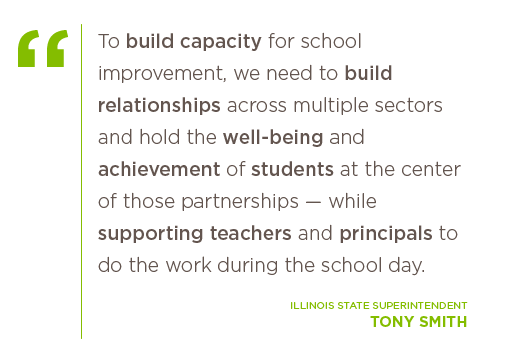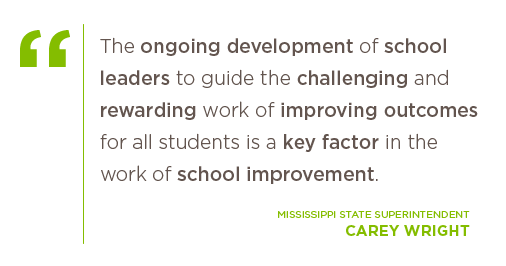In July, we interviewed two chief state school officers, Illinois State Superintendent Tony Smith and Mississippi State Superintendent Carey Wright, to gain insight on what they believed was critical to school improvement. A common theme emerged among their responses and has been echoed by state leaders across the country: Absent a strong school leader, improving student achievement becomes a nearly impossible feat. The evidence to this effect is not merely anecdotal; research provides that there has not been a single case of successful school turnaround identified without a talented principal at the helm. This leads us to the question: What exactly do principals do that makes their role so integral to successful turnaround efforts?
The role of the principal in improving student outcomes

As research shows, classroom instruction has the greatest effect on what students learn and, in turn, continues to be an central topic of discussion on improving student success. Ensuring high-quality instruction begins with the selection and placement of effective teachers — which falls under the school principal’s responsibilities. At a Wallace Foundation event, former U.S. Education Secretary Arne Duncan summed this sentiment up by saying, “Great principals attract great talent. They nurture that great talent, and they develop that great talent.”
Additionally, principals’ influence can be seen and heard throughout the entire school building. It is the leader’s role to set a vision and establish a culture for the entire school. In the principal’s role as an instructional leader, they have ability to empower teachers and staff to assume leadership responsibilities and share in decision-making — therefore, creating a culture of shared trust and ownership that is foundational to sustain real change. If this is true, how can states ensure that transformational principals lead their high-need schools?
The role of the state in supporting turnaround principals

While local context and decision-making play an important role, there are also multiple state policy levers that provide the framework for a strong principal pipeline and continuous supports — from preparation and certification to evaluation and ongoing professional learning. State policymakers can choose to allow turnaround principals increased flexibility and support. In Florida, legislation passed this year permanently establishes the Principal Autonomy Program Initiative, which allows participating high-need districts the ability to exchange statutory and rule exemptions for an agreement to meet established performance goals. Policymakers can also choose to formalize incentive programs to recruit experienced principals to lead high-need schools. A long-standing initiative in Arkansas, the Master Principal Program allows the department of education to offer bonus incentives to master principals, with an additional incentive to those selected to serve in a designated school.
Ultimately, school improvement begins with the individual sitting in the principal’s office. As Gov. Bill Haslam recently said, when he announced a comprehensive plan to elevate principal leadership in Tennessee, “I firmly believe that one of the most important things we can do to help our schools succeed is make sure they are led by strong principals.”









